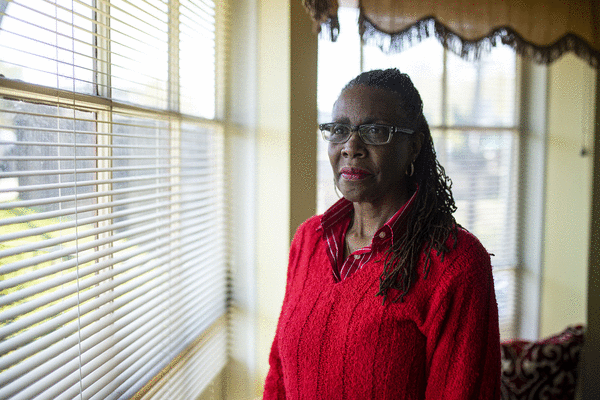[ad_1]
PHILADELPHIA — Rutgers researchers made a startling discovery when the pandemic curtailed routine medical visits: Going virtual to test cutting-edge therapies reached more diverse patients.
Clinical trials test the effectiveness and safety of new medications or devices. Yet the vast majority of such studies do not enroll participants that represent America. Black patients account for, on average, just 5% of clinical trial participants nationally, according to the American Association of Medical Colleges.
Rutgers’ remote experiment with COVID-19 treatments broke down logistical barriers by allowing people to self-monitor symptoms and check in through online portals. Trials typically require participants to make regular trips to medical offices for blood draws and check-ins. These visits can take hours in the middle of a workday, and be inaccessible to people who can’t take time off work, or lack transportation or child care.
The pandemic has proven why change is necessary — Moderna recast its vaccine trials after the initial participant pool was lacking in Black and Latino participants. Philadelphia research hubs now are cutting a path to more equitable clinical trials to address the deep racial disparities in the U.S. health-care system. Rutgers, the University of Pennsylvania, and Fox Chase Cancer Center are among the institutions tackling other entrenched challenges involved, including racism, distrust of medicine, and inadequate community connections.
“The landscape for clinical trials research and participation in clinical trials is dramatically different than it was pre-COVID,” said Reynold Panettieri, director of the Rutgers Institute for Translational Medicine and Science.
Research has found that social determinants of health, such as racism, stress, food insecurity and neighborhood safety, are the leading reasons why people of color experience more severe illness compared with white people. Genetics also can affect how people respond to certain cancer treatments.
“You can’t say you have a new drug and it works on everyone,” said Carmen Guerra, associate director of diversity and outreach at the University of Pennsylvania’s Abramson Cancer Center. “It leaves primary-care doctors and oncologists in a difficult position when we’re trying to treat a cancer patient who is Black or Latino.”
For instance, a medication used to treat leukemia can be toxic for patients who have a specific genetic mutation because it slows metabolism and allows dangerous ingredients to linger in the body. The mutation happens to be most common among Black patients, she said. The only way to learn whether patients also respond differently to new therapies is to include a broad range of patients in trials.
The stakes are personal for Anita Conner and her daughter, Kerri Conner Matchett, both certified public accountants diagnosed with breast cancer a decade apart.
When Conner learned she had advanced breast cancer, in 1998, she would have never thought to ask about a clinical trial.
…continued
swipe to next page
©2022 The Philadelphia Inquirer, LLC. Visit at inquirer.com. Distributed by Tribune Content Agency, LLC.
[ad_2]
PHILADELPHIA — Rutgers researchers made a startling discovery when the pandemic curtailed routine medical visits: Going virtual to test cutting-edge therapies reached more diverse patients.
Clinical trials test the effectiveness and safety of new medications or devices. Yet the vast majority of such studies do not enroll participants that represent America. Black patients account for, on average, just 5% of clinical trial participants nationally, according to the American Association of Medical Colleges.
Rutgers’ remote experiment with COVID-19 treatments broke down logistical barriers by allowing people to self-monitor symptoms and check in through online portals. Trials typically require participants to make regular trips to medical offices for blood draws and check-ins. These visits can take hours in the middle of a workday, and be inaccessible to people who can’t take time off work, or lack transportation or child care.
The pandemic has proven why change is necessary — Moderna recast its vaccine trials after the initial participant pool was lacking in Black and Latino participants. Philadelphia research hubs now are cutting a path to more equitable clinical trials to address the deep racial disparities in the U.S. health-care system. Rutgers, the University of Pennsylvania, and Fox Chase Cancer Center are among the institutions tackling other entrenched challenges involved, including racism, distrust of medicine, and inadequate community connections.
“The landscape for clinical trials research and participation in clinical trials is dramatically different than it was pre-COVID,” said Reynold Panettieri, director of the Rutgers Institute for Translational Medicine and Science.
Research has found that social determinants of health, such as racism, stress, food insecurity and neighborhood safety, are the leading reasons why people of color experience more severe illness compared with white people. Genetics also can affect how people respond to certain cancer treatments.
“You can’t say you have a new drug and it works on everyone,” said Carmen Guerra, associate director of diversity and outreach at the University of Pennsylvania’s Abramson Cancer Center. “It leaves primary-care doctors and oncologists in a difficult position when we’re trying to treat a cancer patient who is Black or Latino.”
For instance, a medication used to treat leukemia can be toxic for patients who have a specific genetic mutation because it slows metabolism and allows dangerous ingredients to linger in the body. The mutation happens to be most common among Black patients, she said. The only way to learn whether patients also respond differently to new therapies is to include a broad range of patients in trials.
The stakes are personal for Anita Conner and her daughter, Kerri Conner Matchett, both certified public accountants diagnosed with breast cancer a decade apart.
When Conner learned she had advanced breast cancer, in 1998, she would have never thought to ask about a clinical trial.
…continued
swipe to next page
©2022 The Philadelphia Inquirer, LLC. Visit at inquirer.com. Distributed by Tribune Content Agency, LLC.

Leave a Reply